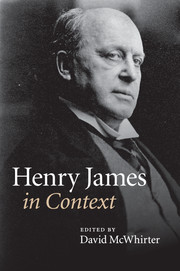Book contents
- Frontmatter
- Contents
- List of Illustrations
- Notes on Contributors
- Preface
- Abbreviations
- Chronology
- Part One Life and career, times and places
- Chapter 1 Nineteenth-century America (1843–1870)
- Chapter 2 Nineteenth-century Europe (1843–1900)
- Chapter 3 Victorian England (1870–1890)
- Chapter 4 Fin-de-siècle London (1890–1900)
- Chapter 5 The twentieth-century world (1901–1916)
- Chapter 6 Autobiographies and biographies
- Chapter 7 Letters and notebooks
- Chapter 8 The James family
- Part Two Historical and cultural contexts
- Part Three Reception
- Further reading
- Index
- References
Chapter 4 - Fin-de-siècle London (1890–1900)
Published online by Cambridge University Press: 05 August 2014
- Frontmatter
- Contents
- List of Illustrations
- Notes on Contributors
- Preface
- Abbreviations
- Chronology
- Part One Life and career, times and places
- Chapter 1 Nineteenth-century America (1843–1870)
- Chapter 2 Nineteenth-century Europe (1843–1900)
- Chapter 3 Victorian England (1870–1890)
- Chapter 4 Fin-de-siècle London (1890–1900)
- Chapter 5 The twentieth-century world (1901–1916)
- Chapter 6 Autobiographies and biographies
- Chapter 7 Letters and notebooks
- Chapter 8 The James family
- Part Two Historical and cultural contexts
- Part Three Reception
- Further reading
- Index
- References
Summary
The present chapter offers an account of James’s passage through London at the end of the nineteenth century, when the metropolis was as agitated as the author’s career, and when the pressures of modernization intersected with his own vocation of modernity. During the last years of the century James’s ruminations about urban life met his self-consciousness about literary ambition. London was more than the context for his maturing career; it was a subject, even a protagonist, of his narratives; it was a source of incident and image; it affected much of his critical thinking and also his ongoing self-invention as a modern writer.
James’s essay on ‘London’ (1888) is a complex text that looks back to the ambitious novel of two years before, The Princess Casamassima, but also ahead to the circumstances of London life in the century’s final decade. The essay unfolds under the sign of affirmation, with James cheerfully naming himself a ‘London-lover’ (CTW-1, 18) who glories in the pleasure that the city has afforded him. The emphasis falls on the invigorating magnitude of the urban field: ‘The immensity was the great fact, and that was a charm; the miles of housetops and viaducts’ (15); the eye is ‘solicited at any moment by a thousand different objects’ (19); ‘there is no such thing as the whole of it. It is immeasurable – embracing arms never meet’ (35).
- Type
- Chapter
- Information
- Henry James in Context , pp. 37 - 46Publisher: Cambridge University PressPrint publication year: 2010



